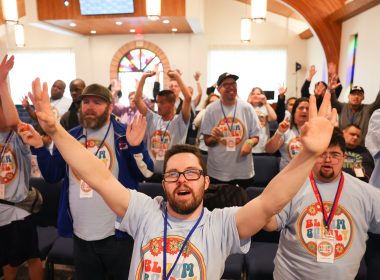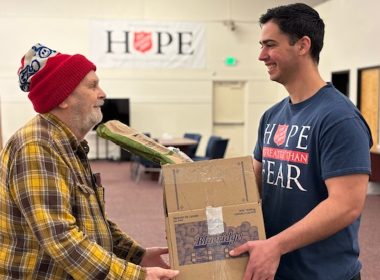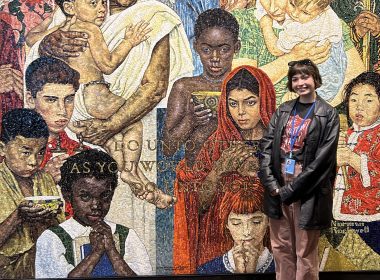INTERNATIONAL COMMISSION ON OFFICERSHIP
 General John Gowans |
In a letter from International Headquarters sent to all Salvation Army officers, General John Gowans has responded to the 28 recommendations of the recent International Commission on Officership and set out an action plan for the implementation of each decision.
The General reached his decisions, he explains, only after careful review of a vast amount of advisory material, including the results of a worldwide survey to which 12,600 officers responded, the deliberations of the June 2000 International Conference of Leaders, nearly 500 letters, and many discussions with individual officers.
General Gowans says that in making his decisions the ‘key and governing principle has been the advancement of the Army’s mission.
“God raised up The Salvation Army for a purpose. He gave it a mission. As I have reflected on each recommendation, my principal thought has been: Will acceptance of this recommendation help or hinder the Army’s fulfillment of its God-given mission–in the world as a whole and in each particular part of it?”
Flexibility…in marriage
In the light of this criterion, the General has moved, also, to introduce a degree of flexibility into the officer marriage regulations by deciding to permit approved territories to allow an officer in exceptional circumstances to be married to a non-officer, whether through only one of the spouses being trained and commissioned, or through the voluntary resignation of one spouse of an officer couple, or through the re-acceptance of one spouse only of a former officer couple.
The current regulation that allows the possibility of continuation in officership for the spouse of a dismissed officer will be retained and made more widely known. Also, in any territory, an officer who marries an auxiliary-captain, cadet or accepted candidate, will be permitted to retain his or her commission and rank.
…in entrance age
Among a number of significant changes is the decision that non-residential, all-age training leading to full commissioned officership will be permitted in any Salvation Army territory that wishes it, such training to be related to the needs of the candidate and the circumstances and goals of the territory. This change will make commissioned officership a possibility for many Salvationists who feel called to full-time service but who because of age or other circumstance have not been able to take up the traditional two-year training college course. Residential training will, of course, continue as the normal means of preparation for officer service.
…in non-commissioned service
The International Commission on Officership was asked specifically to consider the possibility of short-term service as an option for officers. General Gowans has disallowed this for officers, but has decided that Salvationists wishing to give an agreed term of service, or service not bound by the full conditions of officership, will be able to do so with the rank of lieutenant. Lieutenant will, therefore, be-come a non-commissioned rank, but will, the General says, clearly designate the person holding it as an authorized leader within the Army.
…in reviewing rank
The intention for auxiliary-captaincy, envoyship and other existing models of non-officer full-time service is that they will be phased out as those eligible for them either move into commissioned officership or become lieutenants under the new system.
With this change, the initial commissioned rank becomes that of captain. A full review of the system of ranks for commissioned officers will be undertaken with a view to simplifying it even further.
…in full use of women/singles
A number of other decisions made by the General will have the effect of involving more officers in the planning and decision-making bodies and processes of HQ, with special concern for the full use of capable and qualified married women, single and younger officers. This is seen both as proper stewardship by the Army of the gifts and talents of officers, and as a means of increasing accountability and encouraging initiative.
These decisions come within the context of the General’s expressed intention that the Army should continue to move away from authoritarian models of command towards more consultative modes of leadership.
…ethnic understanding
Another aspect of leadership that General Gowans has moved to develop is that of greater sensitivity and understanding be-tween ethnic groups. He wishes territories not already doing so to incorporate orientation in cross-cultural ministry into their leadership training and working practices. The General wants consideration to be given within each territory to the possible need for someone to be identified as having specific responsibility for the promotion of ethnic ministries and cultural awareness within the territory.
In brief, other decisions made by the General are:
* Shared evaluation for all officers at regular intervals will be mandatory.
* Divisional and territorial headquarters boards and councils may have representative membership from outside the headquarters.
* The officers’ covenant will be reworded to make unambiguous the concept of lifelong dedication to God, and to relate the wording more directly to the Army’s international mission statement.
* The officers’ undertakings will be reviewed to simplify the document, if possible, and clarify its intent.
* All territories will move towards paying each married officer a separate and equal allowance, provided that certain conditions are met.
* Officers will no longer need to seek HQ permission to marry, and age disparity re-strictions on marriage will be revoked.
* All territories will make provision for the payment of a termination grant to officers who resign, and will work towards setting up a portable pension or equivalent scheme for officers.
* In certain places, under certain conditions, ‘tent-maker’ ministries will be permitted as a temporary measure.
…officership task forces
In order to provide advice to territorial commanders and to expedite and facilitate implementation of the General’s directives, officership task forces will be set up at IHQ and in each territory. These advisory bodies will be disbanded after one year. Copies of their reports will be provided to the General for his personal attention.
Also, a number of General’s representatives will be appointed to hold zonal and territorial seminars dealing with the various spiritual and practical leadership issues raised by the report of the International Commission on Officership and the General’s responses.
…memo from the Chief of the Staff
The General stressed in his letter that no proposed change outlined in his action plan will come into effect, and no attempt at implementation should be made, until a minute or memorandum from the Chief of the Staff is issued on subject in question. In many cases, new or amended orders and regulations will need to be prepared and authorized.
The General is aware of the dangers of making known his intentions before action details have been finalized, but says that in a matter of such importance he owes it to the Salvationists of the world to let them know as early as possible the tenor of his thinking.







